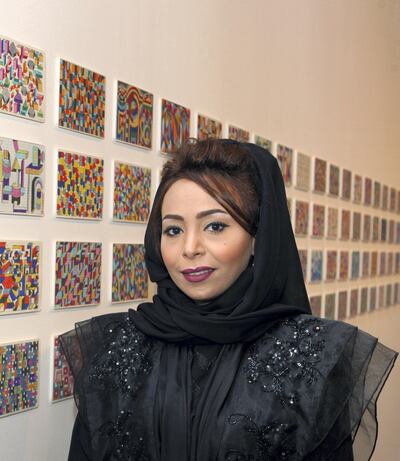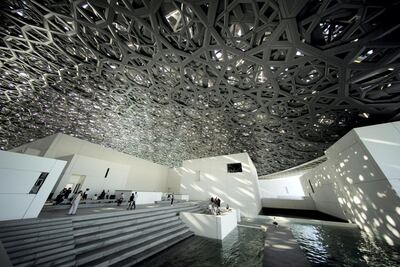The UAE has changed so much since I was born in Sharjah in the 1970s, four years after the federation of the union. When I was growing up, my father noticed I wasn’t captivated by the same toys as other children so he bought me colouring books and art supplies, sketchbooks and oil pastels. I spent a whole summer painting but when I graduated from high school, there were no art schools in the region.
As the UAE celebrates its 48th National Day, I have been reflecting on how different the country is since my visit last month for Abu Dhabi Art. I was selected to be the face of the visual campaign of the inaugural Al Burda Endowment, a Dh500,000 biennial fund supporting artists who explore and integrate Islamic art in their practice, and chosen as one of 10 artists – five local, five international – for the first round of grants. Myself and three of the other artists – Aljoud Lootah, Khalid Al Banna and Ammar Al Attar – are Emirati, so this is a really positive move for art in the UAE, and marks a great year for me personally.
I first had the idea for Focal Illusion, the work I created with the endowment launched by the Ministry of Culture and Knowledge Development, a decade ago. I was producing sketches and paintings and hoping I would one day have the money to create a three-dimensional work, so this is a dream come true. It is rare to find someone who believes in you and your ideas, and gives you the support you need.

When it comes to the arts, there are a lot more opportunities for artists now than there were when I was growing up. There is also a greater focus on emerging artists. Ten years ago, all the biennales and big exhibitions were for well-established or mid-career artists but at this year’s Abu Dhabi Art, there was a lot more support for young Emirati talent. I would love to see this happen more in the future. Traditionally art was thought of as just a hobby; now there is greater recognition of its importance regionally and globally.
I see other changes too. Louvre Abu Dhabi has been a relatively new addition to the landscape, and its architecture and collection are an amazing resource. With all the new museums in the pipeline, it is not simply about creating buildings; we are creating humanity.
Much of my practice focuses on my identity as an Emirati woman. Identity is not simply about nationality, where you come from or even about what you do. As an artist, I feel my role on Earth is to document my experiences like a journalist. Artists are not just living in isolation in our studios. My work represents me as an Emirati woman, with everything that entails and how society sees us. We are wives, mothers and daughters but we are also ministers.
In the UAE, a lot is being done in terms of gender equality. It is amazing to see people like Noura Al Kaabi and Sheikha Hoor Al Qasimi, for example, serving in top positions. They are role models for us. There is still more to be done but women in the Arab world are making headway when it comes to societal structures and changing the world's perceptions. I have a piece titled Women's Circles and it talks about how women living in the Arab world deal with the issues they face, whether societal or religious, and how the world sees them. It talks about their humanity. This, to me, is identity.

The younger generation have a lot more freedom. In 2006, when I started doing performance art in the street, I had to argue with people who thought it was anti-Islamic. It was my job to educate people and to be strong, and people are now more accepting and understanding.
You cannot just live in the past. We have to think about the future but still keep our culture, our language and our traditions. The younger generation need to know where they came from. We can be a forward-looking country while also carrying with us our culture and heritage. My niece is 15 years old and goes to an international school, where most of her friends and teachers are American. Some of her generation do not speak Arabic. We cannot blame them but it is important that we preserve our traditions. Modernity has its benefits, however; while my father bought me colouring books, I bought her a digital sketchbook that allows you to paint and draw on a computer screen. We have to find a way to relate to youth in a language they understand. Art to me is a global language and it is one way to communicate that message.
I live in the US now and am able to compare two different societies. Emirati society was built on foundations of religion, respect and traditions. I am so proud to be from the UAE and carry these traditions with me. I take them with me, wherever I am in the world.
Ebtisam Abdelaziz is a multidisciplinary Emirati artist and one of the recipients of the UAE Ministry of Culture and Knowledge Department’s inaugural Al Burda Endowment

